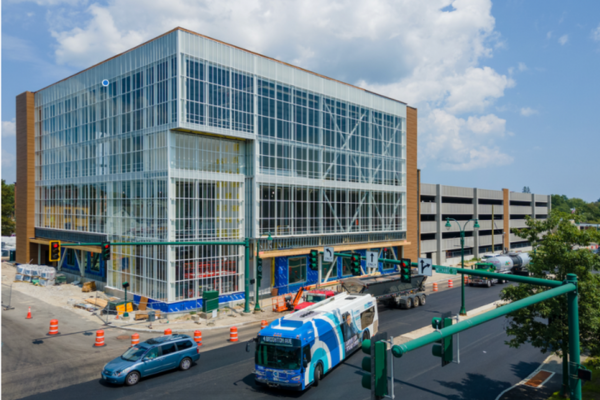Vertical Harvest Farms Secures USDA Loan Guarantee & Maine’s First C-PACE Funding for Industry-leading Project Financing
Deal Recognizes Power of Public-Private Partnerships to Bolster State’s Food System
Vertical Harvest Farms, an indoor farming company focused on customized employment for people with disabilities, is proud to announce the closing of $59.5 million in project financing to develop and operate a 51,000 square-foot hydroponic vertical farm in downtown Westbrook, Maine.
The project is a critical piece of the state’s food system infrastructure and will significantly contribute to the New England Food Vision, where the region’s six states committed to a goal of locally producing 30 percent of the food consumed in the region by 2030 (and 50 percent of the region’s food by 2060), by producing approximately 2.5 million pounds of fresh, leafy greens every year – ranging from mature lettuce, petite greens, microgreens and herbs.
This project also aligns with Vertical Harvest’s “feed locals first” philosophy and goal of providing greens from farm-to-fridge within 24 hours. In this way, the company helps New Englanders avoid the 30 percent loss of nutritional value that occurs within three days of harvest, which widely affects the produce shipped into the region from California, Arizona and abroad. It also significantly helps mitigate food waste by providing longer shelf life and less shrinkage at the retail and institutional level. The company offers these benefits while fulfilling its dual mission to grow food and futures by offering meaningful employment for people with disabilities in this emerging, tech-forward sector.
Vertical Harvest CEO Nona Yehia said, “We’re on a mission to grow food as local, fresh and fair as possible, and ensure there’s a place at the table for everyone in the future of food.”
As the US became a net food importer for the first time ever in 2023, stakeholders are realizing that traditional agriculture is under greater stress from extreme weather, water scarcity and climate change. This has made diversifying food production, leveraging technologic innovations, shortening supply chains, and ensuring access to fresh local food for years to come, imperative. USDA Rural Development recognizes this as well and is incentivizing efforts to future proof the food system.
“As ‘The People’s Department’ we are happy to support fresh food, and good jobs here in Maine, as well as the equity of access to both. USDA Rural Development is committed to building communities and feeding Mainers, and we look forward to Vertical Harvest being a part of the team fulfilling those shared goals,” said USDA Rural Development Maine State Director, Rhiannon Hampson.
This funding also aligns with the CEA Industry’s shift to project-level financing. Vertical Harvest is excited by the public and private partners that made this deal possible.
“We are thrilled to provide financing and partner with Vertical Harvest. Through two pioneer programs from the USDA and other community facilities, we were able to creatively structure this challenging project. We believe this will have a tremendous impact on the local community and the future of food production,” said Alexios Georgousis, Madison One CUSO.
The funding was led by Madison One and Genisys Credit Union and includes $25 million and $23,795,000 loans that utilize USDA Rural Development Business & Industry Loan Guarantees and Rural Energy for America Program (REAP) Renewable Energy and Energy Efficiency Loans, respectively.
This financing is supplemented by a $8,655,189 Commercial Property Assessed Clean Energy (C-PACE) loan – the first in Maine administered by the Efficiency Maine Green
Bank and issued through Nuveen Green Capital – and $2,000,000 of American Rescue Plan (ARPA) funding through the Finance Authority of Maine (FAME).
“We are pleased to have approved Vertical Harvest for this funding through the Efficiency Maine Green Bank in partnership with one of our capital providers, Nuveen Green Capital,” said James Neal, senior manager for finance initiatives at Efficiency Maine. “We strongly encourage more of Maine’s municipalities to follow Westbrook’s example and adopt this ordinance so their local businesses can take advantage of this unique pathway to finance energy improvements, such as upgrading lighting or installing heat pump systems for heating and cooling in their buildings.”
In addition, borrower and partner contributions of $19,189,210 are possible thanks to partners such as Crossroads Impact Corp, Enhanced Capital, Foundation Credit, Waterside Financial, Maine Technology Institute, and others.
“Public-private partnerships benefit a wider group of stakeholders than private capital can alone,” said Enhanced Capital’s Chief Impact Officer and Managing Director Gingee Prince. “In 2017, we partnered with Vertical Harvest to pioneer this space and are excited to see them building even more ambitious capital coalitions today.”
This array of funding follows Vertical Harvest’s model of using public-private partnerships to catalyze resilience within a state’s food system. The company believes this financing model, piloted in Wyoming and now proven in Maine, will pave the way for financing future farms such as the company’s next facility in Detroit, Michigan to be developed in partnership with Bedrock. By bringing together municipal, state and federal funding alongside private capital, not only is the company relocalizing production of perishable produce closer to consumers, but because of Vertical Harvest’s social mission, delivering outsized impact, inclusively.
About Vertical Harvest
Vertical Harvest is a hydroponic, vertical farming company dedicated to community-oriented farms, food and futures. In addition to their passion for local, healthy food grown sustainably, Vertical Harvest also operates on an inclusive, customized employment model with farms designed for accessibility and staffed via hiring practices developed to support meaningful employment for people with disabilities. For more information visit www.verticalharvestfarms.com and sign up for the newsletter, or https://verticalharvestfarms.com/invest-in-vertical-harvest/ to learn about a community raise or follow on socials at @verticalharvestfarms.
